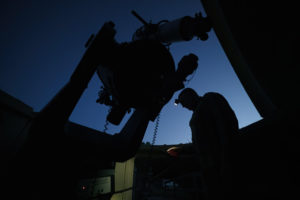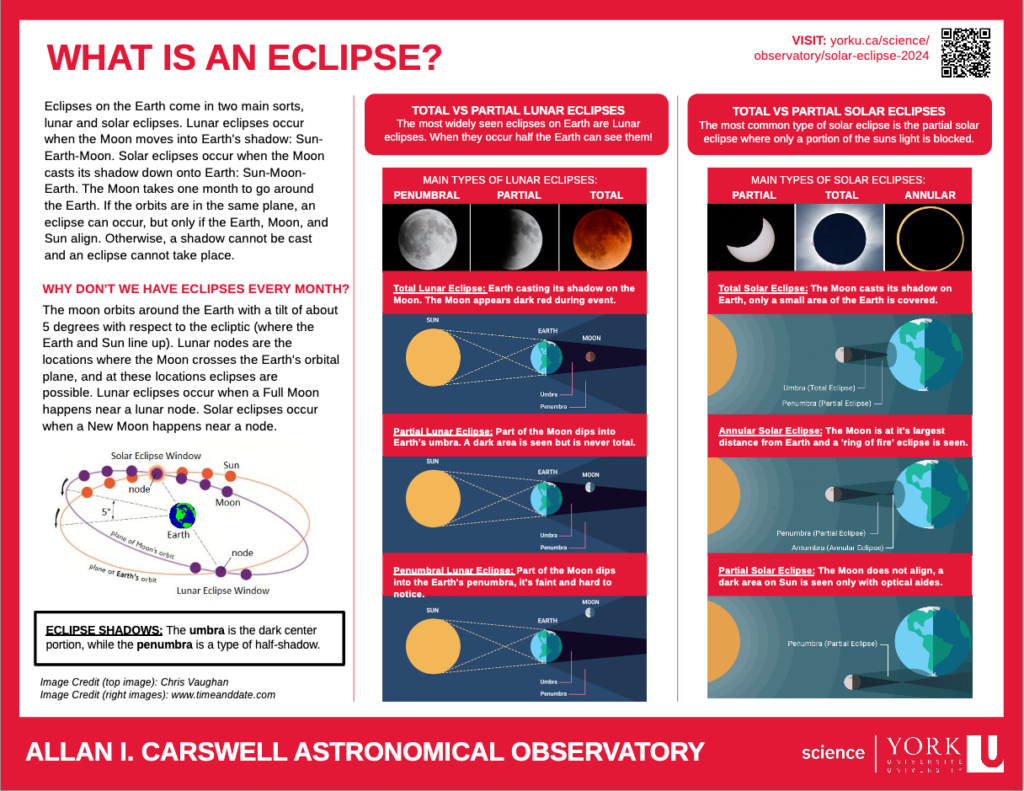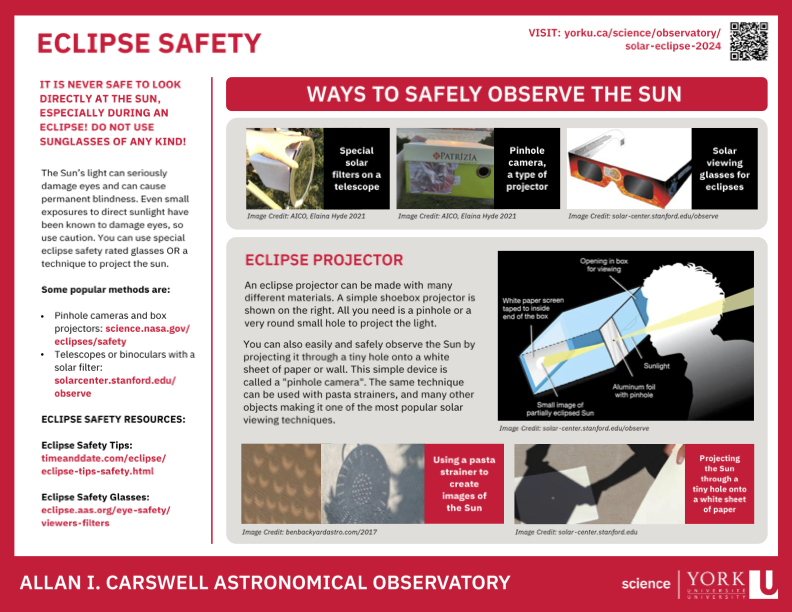Do Not Look Directly At The Sun
A few lucky locations saw the special total eclipse, of note are: Niagara Falls, Hamilton, parts of Montreal and all of Granby in Quebec... and a few spots in New Brunswick as well as Newfoundland and Labrador
To see what time the eclipse started in your location (every city is different) and how close you are to totality, use the eclipse map here.

Solar Safety 101: You can use several techniques to project the Sun's image where it is safe to see for more, see our Solar Safety sheet and the resources area below.
This page hosts the solar eclipse 2024 information for York University and the Allan I Carswell Observatory. Read about our pre-eclipse solar viewing events! As it says above, whatever day it is, wherever you are, please DO NOT under any circumstances, look directly at the Sun. Human eyes can be seriously damaged, and it can even cause blindness. There are many SAFE ways to indirectly view the sun, see below for some options.
Solar Viewing Events from Allan I Carswell Observatory and York University
Downsview Park: March 9th
The Allan I Carswell Observatory travelled to Downsview Park for a special public session of solar observing (although it was a bit cloudy) and eclipse information. Registration closed.
Solar Education Day: March 23
The solar education event at York AICO featured solar observing, a walkthrough of the solar system and eclipse information. This event was at York campus 12 noon - 2 pm March 23. Registration closed.
First Clear Day: April 2-6
As might be expected, the FIRST clear day was a challenging event. Due to a cloudy week we had no-go calls until a successful day on April 6th! Registration closed
The Eclipse: April 8
No public events were hosted on April 8th since York University is not in totality. There was observing and solar glasses for over 300 faculty, students, and staff on campus that day though!
AICO Resources
What is an Eclipse, and how do the Earth, Moon and Sun line up? Check out the AICO Eclipse flyer.
The Solar Safety Flyer, check out some extra solar safety tips here at our AICO flyer.
Three easy ways to view the eclipse without harming your eyes
Our Events Brochure, map, information, events and more in this AICO flyer! Note printed back to front with no margins it will make a single 6 sided brochure when folded.
Events Brochure, alternate format (single page)
The AICO About Eclipses Video featuring guest speaker Dr. Jeffrey Linsky and the observatory Teletube crew Maheen, Noor, Cam and Zena.
Darkness & Light Eclipse Talk Video featuring Ian Mclennan and Dr. Elaina Hyde
Our Eclipse Viewers Blog Area, featuring prof. Robin Metcalfe of York University and Bruce Waters of our Astronomer in Residence Program.

Bruce has been teaching astronomy to the public since 1981 and in the provincial park system every year since 1985. He was at the McLaughlin Planetarium as star theatre operator, producer and educator and ran the last public star show with the hope that, one day, the stars would shine down upon Toronto again. He is also the author of the Ontario Parks monthly astronomy blog. Finally, he is the co-founder of Stars over Killarney - an annual astronomy program featuring topics that connect to the Park (2018).
More Resources, Information, and Tips
Canadian Space Agency Eclipse Page
ASP Solar Yardstick and Resources
Space Place Canada Eclipse Page
Eclipse activities for educators
How often does an Eclipse Happen?
What Does the Magnitude of an Eclipse Mean?
How to SAFELY view an image of the sun
AAS Safe Solar Viewers, Glasses and Filters
AAS Solar Telescopes and Binoculars Guide
Solar Observing 101 Sunspots and more
Sunspots info from Earth Observatory
Solar Phenomena and How to View Them pdf
Sunstorms infographic Space.com








































